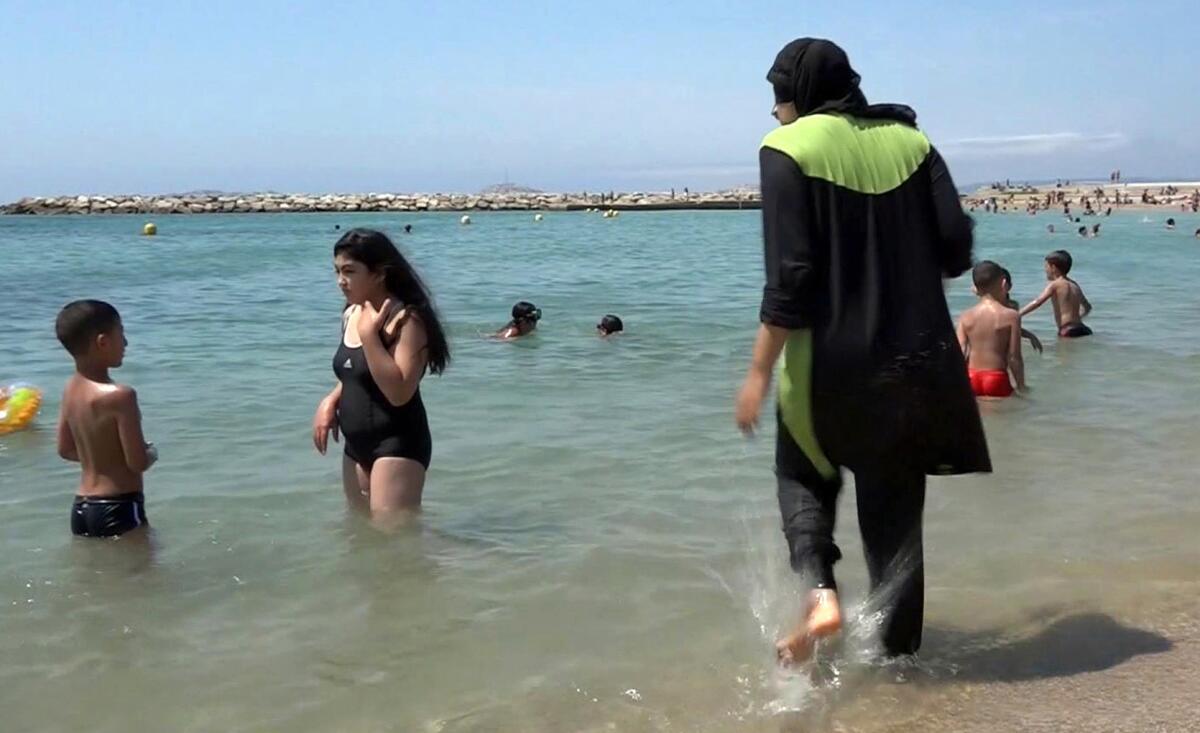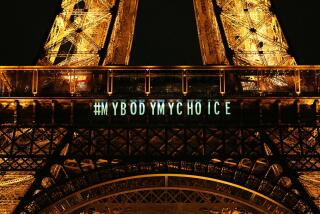As women are fined for wearing head scarves, French activists push back on ‘burkini’ ban

- Share via
Reporting from Paris — French human rights campaigners have asked the country’s highest court to rule on the legality of the so-called burkini ban after a public outcry over police fining Muslim women wearing head scarves.
In one incident, police fined a woman wearing a traditional head scarf knotted at the nape of her neck and a long matching tunic over tight leggings on a beach in Nice. Photographs showed four male officers carrying guns standing over the woman as she stripped off her tunic, though the Nice mayor’s office denied that she had been forced to remove clothing.
Other videos have emerged of women and girls being told to remove head scarves or leave Cote d’Azur beaches.
Several resorts in the French Riviera have banned burkinis and other clothing deemed ostensibly religious in response to increased tension after this summer’s attack in Nice in which an Islamic State sympathizer drove a truck at high speed through crowds celebrating the Bastille Day holiday, killing 86.
Officials deem the burkini, which covers the body and head, to be a challenge to French values of secularism and gender equality and a threat to public safety after complaints and outbreaks of violence. On the French Mediterranean island of Corsica last weekend, about 200 police officers broke up brawling locals who had apparently turned on a family that included two women wearing what some believed was religion-mandated clothing.
Opponents of the ban say it is discriminatory and will only ramp up tension by suggesting all those wearing Islamic dress have terrorism links.
Feiza Ben Mohamed, spokeswoman and secretary general of the Southern Federation of Muslims, who has dubbed the controversy “BurkiniGate,” posted a video online showing four young girls — one wearing a head scarf, another a T-shirt and shorts — being cautioned by police.
After a series of videos emerged on social media of women being fined for wearing not just the burkini but dress considered incompatible with France’s secular principles, the Council of State, the nation’s highest administrative body, is expected to rule on the burkini question Thursday after the French Human Rights League said the ban was illegal and an attack on basic freedoms.
Its ruling will provide a legal precedent for other towns seeking to ban controversial clothing.
In another incident, a woman who gave her name only as Siam contacted the news media to say she had been fined and ordered off a beach in Cannes because she was wearing a hijab.
The 34-year-old mother of two, who is a former flight attendant, said she was warned that she was not dressed “correctly and with respect to standards of secularism,” according to the citation she showed Agence France-Presse.
After she refused to pay the $12.37 fine, she said, officers asked her to leave the beach.
“I was sitting there on the beach with my family. I was wearing a classic head scarf, a flowered hijab. Three police came up to me and said I wasn’t wearing ‘correct’ dress. I wasn’t there to be provocative and I had no intention of swimming.
“I was totally shocked. I heard things nobody has ever said to my face before like ‘Go home’ and ‘Madam, the law is the law. We’ve had enough of these things,’ or ‘Here we’re Catholics.’”
A witness to the Aug. 16 incident in Cannes, Mathilde Cusin, a journalist with France24, confirmed the woman’s version of events.
“The police said they were only applying the law. The saddest thing was there were people shouting [at the woman,] ‘Go home,’ and some were applauding the police. They were telling her to leave or take off her scarf. It was so quite violent,” Cusin told Agence France-Presse that day. “During all this, her daughter was crying.”
On Monday, a Nice tribunal ruled that the burkini ban in Villeneuve-Loubet was “necessary, appropriate and proportionate” to prevent public disorder. It said the beach wear was “liable to offend the religious convictions or nonconvictions of other beach users.”
On Wednesday, Interior Minister Bernard Cazeneuve had an emergency meeting with Anouar Kbibech, president of the French Council of the Muslim Faith.
“A few days ago, a woman was given a verbal warning on a Cannes beach when she was wearing a simple scarf while accompanying her children.… Today, we discover pictures of police officers making a woman on a beach in Nice to take off her tunic, when she wasn’t even wearing a burkini,” Kbibech said afterward.
“In the very serious and critical situation France finds itself following the tragic attacks that have profoundly hit the country, we call for wisdom and responsibility for everyone. Today we need more than ever to show calm and tolerance.”
Cazeneuve told journalists that the clothing bans “must not lead to stigmatization or division.”
According to French Riviera police, 16 women have been given verbal warnings for wearing inappropriate clothing in Nice and six in Cannes.
By Wednesday lunchtime, the photos of the woman removing her tunic had caused a social media storm with the hashtag #WTFFrance tweeted more than 20,000 times.
In the Guardian, Australian clothing designer Aheda Zanetti, who claimed to have created the burkini, said she intended it to “give women more freedom, not take it away.”
“I would love to be in France to say this: You have misunderstood. And there [are] more problems in the world to worry about, why create more?” she wrote. “You’ve taken a product that symbolized happiness and joyfulness and fitness, and turned it into a product of hatred.”
ALSO
As Venezuela’s farms and factories falter, the country struggles to feed its people
Grainy footage appears to show kidnapping of son of Mexican cartel leader ‘El Chapo’
More to Read
Sign up for Essential California
The most important California stories and recommendations in your inbox every morning.
You may occasionally receive promotional content from the Los Angeles Times.










